The Dogs: Some
Statistics
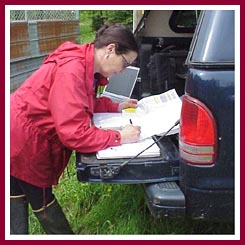 |
"Of the
76 dogs on the Adams property, 18 came from the local shelter -- officially or
unofficially. 15 were 'unsold stock' from a puppymiller. Three were strays, one
came from another shelter, and 39 were born onsite! Several of the adult
females had been born there and had gone on to have puppies themselves; one dog
is due to whelp again the first week in June. I have no doubt these people will
start this all again, and there is NOTHING we can do about it. The County
granted them a kennel permit...and told them that where they live 'they can
have as many dogs as they want.'"
|
| |
|
Table 1: Breeds/Ages/Genders*
|
Breed
|
Total # |
1+ yr old |
6 mo - 1 yr |
Under 6 mo |
M |
M/N |
F |
F/S |
| Beagle |
1 |
1 |
|
|
|
1 |
|
|
| Border Collie |
1 |
1 |
|
|
|
|
1 |
|
| Border Collie Mix |
3 |
3 |
|
|
|
2 |
1 |
|
| Husky |
30 |
15 |
4 |
11 |
15 |
4 |
11 |
0 |
| Husky/Border Collie |
6 |
|
|
6 |
4 |
|
2 |
|
| Husky/unknown |
10 |
4 |
|
6 |
4 |
1 |
4 |
|
| Husky/Pit bull |
6 |
1 |
5 |
|
4 |
|
1 |
1 |
| Pit Bull |
1 |
1 |
|
|
1 |
|
|
|
| Labradors |
2 |
1 |
1 |
|
2 |
|
|
|
| Lab Mixes |
5 |
2 |
3 |
|
2 |
1 |
2 |
|
| Newfie Mix |
1 |
1 |
|
|
|
1 |
|
|
| Cocker Mix |
1 |
|
1 |
|
1 |
|
|
|
| Dane Mix |
1 |
1 |
|
|
|
|
|
1 |
| Rottweiler |
1 |
1 |
|
|
|
1 |
|
|
| Rott. mix |
1 |
|
1 |
|
|
|
1 |
|
| Rott/Boxer |
1 |
1 |
|
|
|
1 |
|
|
| Rott/Shepherd |
1 |
1 |
|
|
|
1 |
|
|
| Shepherd mix |
1 |
1 |
|
|
|
|
1 |
|
| Schipperke |
1 |
1 |
|
|
1 |
|
|
|
| St. Bernard mix |
1 |
1 |
|
|
|
1 |
|
|
| Terrier mix |
1 |
1 |
|
|
|
1 |
|
|
| TOTAL |
76 |
38 |
15 |
23 |
34 |
15 |
25 |
2 |
*Note: Please see our
Drive To
Save Lives Photo Album for photos of individual dogs. A quick explanation
of the Album features can be found on Using
the Photo Album.
|
Table 1
summarized:
- 37 of the dogs were purebreds.
- 39 were mixed breeds.
- The majority of the dogs were huskies (30) or some sort of husky mix (22).
Help from shelters or rescues experienced in handling this breed was greatly
appreciated.
- In age, exactly half of the dogs were over 1 year and half were under, with
23 of those being under 6 months, and 13 of the 23 having been born in March
06.
- Actual ages ranged from a few weeks to 16 years.
- Only 17 of the dogs have been spayed/neutered.
- There were 34 unneutered males onsite.
- There were 25 unneutered females onsite. Many of the adult females had had
one or more litters that we knew about.
Top
Table 2:
Where They Came From:
|
Origin
|
Total # |
Pure |
Mixed |
M |
M/N |
F |
F/S |
Notes
|
| Local Shelter (Officially adopted) |
8 |
2 |
6 |
2 |
5 |
|
1 |
Earliest adoption date was Nov. 2002. 5 adopted in
1.5 yrs, 3 alone in June 05, last one adopted on 6 Apr 06. |
| Local Shelter (no paperwork) |
8 |
3 |
5 |
3 |
5 |
|
|
Time frame and circumstances unknown |
| Local Shelter turn-aways |
2 |
|
2 |
1 |
1 |
|
|
Obtained from owners in shelter parking lot |
| Commercial Breeder Yvonne Skinner* |
15 |
14 |
1 |
5 |
4 |
6 |
|
Unsold stock; oldest dog is 6.5 years; the
youngest is 1.5 years. |
| Other shelter |
1 |
|
1 |
|
1 |
|
|
No paperwork |
| Found as strays |
3 |
|
3 |
1 |
|
1 |
1 |
|
| Born Onsite (see also Table 2-A) |
39 |
18 |
21 |
21 |
|
18 |
|
Some pups "second generation;" one or
more parents also born onsite |
|
*Note: Ms. Skinner's kennel, "Woodland
Pets," coincidentally, produced Mr.
Peabody, guiding spirit of the Wisconsin Puppy Mill Project.
|
Top
Table 2-A:
Litters Born Onsite as of 24 June 06:
|
Mother
|
Origin of Mother |
Date of litter(s)/age of pups |
Notes
|
| Sasha |
born onsite |
8 mo. |
Father was Avalanche, also born onsite; from all indications, Sasha's
brother. Their mother was probably Specky, Misty, or Amber, all of whom came
from Yvonne Skinnner. |
| Ginger |
born onsite |
12 Oct 05
12 Mar 06 |
Also had one previous litter, probably Mar 05. Father of Oct 05 litter
probably Brutus, the intact pit bull obtained from the shelter. Ginger's mother
was almost certainly also one of the Skinner "culls." |
| Amber |
Yvonne Skinner |
26 Mar 06 |
|
| Maggie |
Yvonne Skinner |
9 mo. |
|
| Specky |
Yvonne Skinner |
5 Dec 05 |
|
| Trinket |
Yvonne Skinner |
12 Dec 05 |
|
Top
Summary:
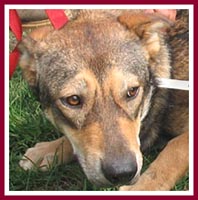 The first question anyone
asks when a situation like the Adamses' comes to light is, "How could this
happen?" The statistics above give some insight into the set of
circumstances which culminated in this intervention. The first question anyone
asks when a situation like the Adamses' comes to light is, "How could this
happen?" The statistics above give some insight into the set of
circumstances which culminated in this intervention.
First
of all, when we look at the official adoptions from the local shelter, where
John Adams volunteered, we are baffled at seeing six dogs adopted within 18
months, and three within one 3-week time frame! Since this shelter supposedly
has a spay/neuter policy, we wonder how two intact males "slipped through
the cracks." Most of all, we wonder why shelter staff didn't check their
own records and screen adoptions more carefully -- John adopted the last dog
from the shelter just two weeks before the intervention, when he already had
over 70 dogs on the property!
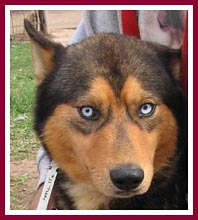 There are no records for
eight of the dogs John says he adopted from the shelter, but again, the fact
that that he admits he took two in the parking lot from owners who were turned
away from the shelter for lack of space provides a clue as to where the other
eight might have come from. There are no records for
eight of the dogs John says he adopted from the shelter, but again, the fact
that that he admits he took two in the parking lot from owners who were turned
away from the shelter for lack of space provides a clue as to where the other
eight might have come from.
It's
striking that slightly more than half of the dogs rescued during
this intervention were born on the Adams property! We have no way of knowing
how many other puppies were born here and sold through classified ads during
the six years or so that most of the dogs seem to have been obtained, but we
can surmise that every spring and fall, there has been a "baby boom."
But,
look at the tables again. Aside from the 18 unspayed females born onsite, and
the one found as a stray, where did the rest come from? John Adams says that
they were unsold "stock" from the commercial breeder he used to work
for, Yvonne Skinner.
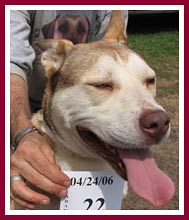 As it is, 54
of the 76 dogs onsite as of 24 April can be traced directly or indirectly back
to this "breeder!" In a 2013 email, Ms. Skinner's daughter
responds, "We are not responsible for what people do after they have
purchased the dog from us," and we agree that this is true. However, in
our opinion, a responsible breeder, wouldn't have had "unsold stock"
to dispose of to begin with; she would have had a waiting list for all the
puppies she bred. She also would have sold her 'pet quality' puppies under a
spay/neuter contract. As it is, 54
of the 76 dogs onsite as of 24 April can be traced directly or indirectly back
to this "breeder!" In a 2013 email, Ms. Skinner's daughter
responds, "We are not responsible for what people do after they have
purchased the dog from us," and we agree that this is true. However, in
our opinion, a responsible breeder, wouldn't have had "unsold stock"
to dispose of to begin with; she would have had a waiting list for all the
puppies she bred. She also would have sold her 'pet quality' puppies under a
spay/neuter contract.
Finally,
the Adamses live in an area where, even after officials have asked rescues to
intervene in what could have become a major cruelty/neglect case, the Adamses
have been issued a kennel license and told that the county will not limit the
number of dogs they may keep. Rescuers have no doubt that the cycle will begin
all over again as soon as the Adamses are out of their direct scrutiny.
It's
easy to say that the Adamses should have known better, they shouldn't have
taken more dogs than they could care for, that they should have had them
altered, etc. But they had plenty of help getting into the situation they found
themselves in.
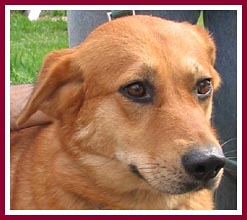 Perhaps their area is
not yet ready for a "no-kill" shelter, particularly since that
shelter appears to be turning away so many animals in need. We cannot create a
'no kill' society until we shut down puppy mills, implement aggressive
spay/neuter programs to prevent unwanted animals, and conduct massive
'responsible pet ownership' campaigns to educate the public that pets aren't --
or shouldn't be -- disposable. And a limit must be set by local governments on
the reasonable number of pets an idividual or family may be allowed to keep. Perhaps their area is
not yet ready for a "no-kill" shelter, particularly since that
shelter appears to be turning away so many animals in need. We cannot create a
'no kill' society until we shut down puppy mills, implement aggressive
spay/neuter programs to prevent unwanted animals, and conduct massive
'responsible pet ownership' campaigns to educate the public that pets aren't --
or shouldn't be -- disposable. And a limit must be set by local governments on
the reasonable number of pets an idividual or family may be allowed to keep.
Until
then -- situations like this will develop, and rescuers will have to go and
clean up the mess.
Previous Page: The
Follow-Up * Next Page: Using
Our Photo Album
|

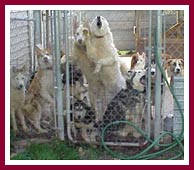

 The first question anyone
asks when a situation like the Adamses' comes to light is, "How could this
happen?" The statistics above give some insight into the set of
circumstances which culminated in this intervention.
The first question anyone
asks when a situation like the Adamses' comes to light is, "How could this
happen?" The statistics above give some insight into the set of
circumstances which culminated in this intervention.  There are no records for
eight of the dogs John says he adopted from the shelter, but again, the fact
that that he admits he took two in the parking lot from owners who were turned
away from the shelter for lack of space provides a clue as to where the other
eight might have come from.
There are no records for
eight of the dogs John says he adopted from the shelter, but again, the fact
that that he admits he took two in the parking lot from owners who were turned
away from the shelter for lack of space provides a clue as to where the other
eight might have come from.
